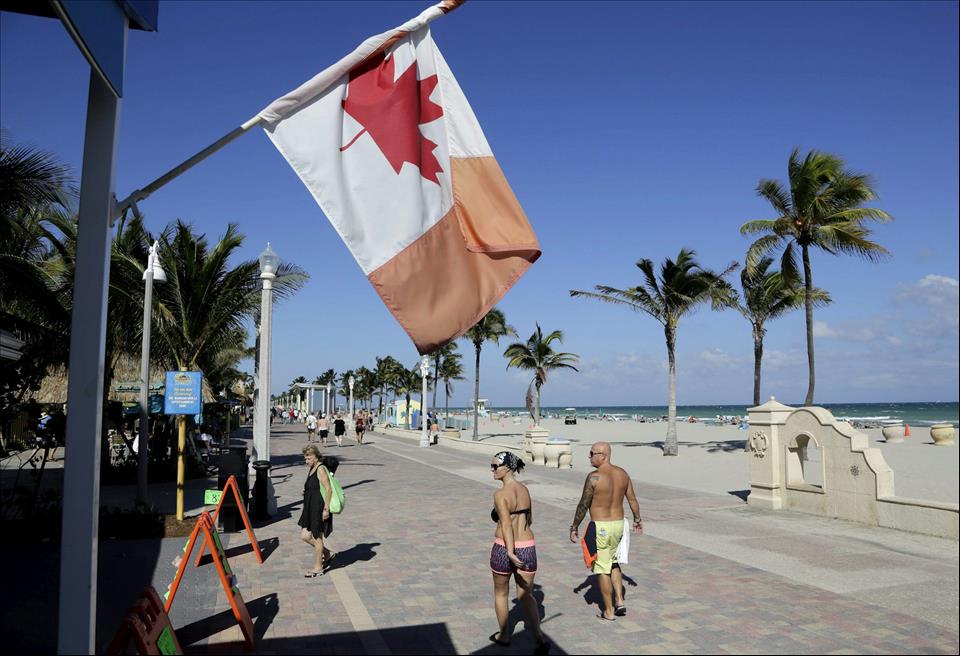
When Canadian Snowbirds Don't Flock South, The Costs Are More Than Financial
First, stories started to emerge from those who said they would no longer participate in this seasonal migration because of political events in the U.S. Another related concern was the weakened Canadian dollar . This trend has prompted some to consider selling their winter properties in the U.S.
More recently, attention has shifted to the potential for changed border rules to lessen snowbirds' access to the U.S. for long stays . Snowbirds are concerned about administrative and procedural requirements that may ultimately make cross-border travel less convenient .
During the COVID-19 pandemic, some Canadian snowbirds experienced challenges crossing into the U.S. for the winter or returning to Canada. Closures of borders to non-essential travel did not dissuade some from planning to winter in the U.S.
Drawing on research in snowbird communities, we found out that affordability and ease of movement are two important enablers of long-stay seasonal travel.
Because of this, it's not surprising that we're hearing from snowbirds again in light of recent developments.
CBC News reports on Québec snowbirds reaction to the Donald Trump administration's new measures for travellers to the U.S. Economic and political disruptions
While COVID-era travel disruptions didn't stop some snowbirds from going south for the winter , the current economic and political disruptions are another story. Florida is a popular destination for Canadian snowbirds. In fact, a 2023 survey named eight of the 10 best American destination communities as being in Florida.
If Canadian snowbirds are talking about cancelling travel plans and selling properties, people in Florida should be paying attention.
Instead, in early March , Florida Gov. Ron DeSantis downplayed what it would mean for Canadians to avoid travel to the state. Citing a recent tourism industry report , he noted that only 3.3 million of the 142.9 million visitors to Florida in 2024 were from Canada.
DeSantis went on to say“that's not much of a boycott, in my book .” But 91.5 per cent of Florida's annual visitors were from the U.S. This means that the 2.3 per cent of visitors who were Canadian were actually a substantial portion of the states's international visitors.
DeSantis's recent comments were also not in line with concerns raised during the COVID-19 pandemic that signalled substantial negative economic impacts for the state if Canadian snowbirds did not arrive for the winter.
During his State of the State address on March 4, Florida Gov. Ron DeSantis downplayed what it would mean for Canadians to avoid travel to the state. (AP Photo/Rebecca Blackwell) Community members
Aside from these economic impacts, something we've learned through our years of research with Canadians who winter in the U.S. is that many become vital members of destination communities. From participating in public health outreach programs to volunteering at local hospitals, our research has shown that many embrace opportunities to be active in the places they reside for the winter .
Any drop in the numbers of seasonal travellers going to U.S. destinations will have social costs for communities beyond the quantifiable economic losses.
Many popular U.S. destination communities for snowbirds have health systems that are designed to expand and retract with dramatically different seasonal populations. Our research has observed this most closely in Yuma, Ariz., where entire areas of the main local hospital are closed in the summer and staffed seasonally in the winter.
Additionally, some of the seasonal nursing staff who arrive for the winter are from Canada . Any retreat from these destinations by Canadian snowbirds may have significant implications for health systems and allied sectors . This can ultimately impact the quality of care they can provide to a more limited local patient base.
Intangible impactsWhile the economic impacts of the seeming loss of long-stay older Canadians in these communities are important to consider, there will be other - less measurable but no less important - impacts. Just as the long friendship between the U.S. and Canada is now being tested, blended snowbird communities of older North Americans are at risk of diminishing .
Business owners in U.S. destinations spoke up about losses when fewer Canadian snowbirds went south during the COVID-19 pandemic. Some Canadian business sectors and communities discovered opportunities emerging from these shifts in consumer' movements .
As snowbirds debate whether to navigate new border complexities and return to the U.S. next winter , we must be attentive to the stories behind the numbers to understand the true impacts of their decisions. And as comments made by DeSantis and other politicians have made clear , Canadian snowbirds are now faced with new economic and emotional considerations.

Legal Disclaimer:
MENAFN provides the
information “as is” without warranty of any kind. We do not accept
any responsibility or liability for the accuracy, content, images,
videos, licenses, completeness, legality, or reliability of the information
contained in this article. If you have any complaints or copyright
issues related to this article, kindly contact the provider above.


















Comments
No comment